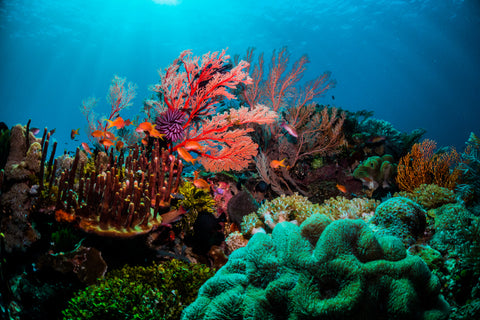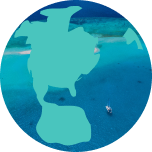
The Truth About Reef-Safe Sunscreens
The truth is, there is no standard test to prove that any product is completely safe for marine ecosystems and coral reefs.
Why do coral reefs matter?
Before we dive into what “reef safe” means (and doesn’t) and why we’re no longer using it to label our sunscreens, it’s important to understand the significance of coral reefs to not just marine life, but to our planet as a whole.
Coral reefs are one of the most diverse and crucial ecosystems on the planet. According to the National Atmospheric and Atmospheric Administration (NOAA), “Because of the diversity of life found in the habitats created by corals, reefs are often called the ‘rainforests of the sea.’ About 25% of the ocean's fish depend on healthy coral reefs.” NOAA notes that fish and other marine life use coral reefs as food sources and shelter, and to safely reproduce and protect their young offspring from predators. In fact, NOAA says, “The Northwest Hawaiian Island coral reefs, which are part of the Papahānaumokuākea National Marine Monument, provide an example of the diversity of life associated with shallow-water reef ecosystems. This area supports more than 7,000 species of fishes, invertebrates, plants, sea turtles, birds, and marine mammals.”
In addition to being a critical part of marine life, coral reefs are extremely important to human beings. They protect our coastlines from increasingly more frequent storms and coastal erosion, they help provide our food, and they are a crucial aspect of the world’s economy, with over half a billion people relying on coral reefs for income from diving, fishing, and snorkeling industries. And, according to the World Economic Forum, “25% of fish species spend some part of their life cycle in reefs, despite the fact that they cover less than 1% of the ocean floor. Losing such an essential part of the ocean environment could therefore have rippling effects that cause much broader collapse. As Michael Crosby, a marine scientist and the president of Mote Laboratory and Aquarium, told Business Insider for a recent feature on reef restoration, loss of reefs could have potentially terrifying consequences. ‘Estimates are that up to 80% of the oxygen you are breathing in right now comes from the ocean. It doesn’t come from the land. In order for you to continue to breathe, you have to have a healthy ocean.’”

What does “reef safe” mean?
If a sunscreen is making the claim “Reef Safe” or “Reef Friendly” it probably means they are not including known harmful ingredients – like oxybenzone and octinoxate– although there is no set standard for what “reef safe” truly means. When a law in Hawaii went into effect in 2021 that banned these two ingredients–found commonly in chemical sunscreens, including many mass market brands–it was based on “a 2016 study by Craig Downs and colleagues at the Haereticus Environmental Laboratory, which showed that these two chemicals were to blame for slowing coral growth and increasing the rate of coral bleaching” (smithsonianmag.com). Coral bleaching causes the corals to turn white and the algae it hosts, so beneficial to marine life, to depart the reef. According to the World Economic Forum, research has found that “corals absorb oxybenzone, and then convert it into phototoxins. These molecules become harmful when exposed to sunlight. Coral bleaching events, which can be caused by climate change and warming oceans, make the corals more susceptible to sunscreen accumulation and its damaging effects.” A harmful cycle of reef damage is then perpetuated.
When you see the claim “Reef Safe” or “Reef Friendly” on a product, you may assume that the ingredients studied and shown to harm reefs are not in the formula. What’s important to realize here is that avoiding these two ingredients does not guarantee the absence of any other ingredient with a detrimental effect on the environment.

What doesn’t it mean?
While being “Reef Safe” or “Reef Friendly” may be rooted in the best of intentions, the truth is, there is no regulation around these terms. That means there is no government body or other reputable third party that vets these claims or reviews every ingredient in a sunscreen formula claiming “Reef Safe” to ensure it’s safety. In fact, there is not enough scientific research in existence on this topic to prove the complete safety of any sunscreen.
There are myriad factors that could impact the safety of a sunscreen formula, from the actual ingredients in the product, to the volume of formula that a reef is exposed to, or the length of time during which the exposure occurs. And the truth is, because there is no standard by which to measure what’s actually safe for marine life in the long term–and because science is ever-evolving as we gain more information through years-long studies–the term “reef safe” isn’t nearly as cut and dry as we want it to be. There may, unfortunately, be ingredients outside of the two that Hawaii banned that are still negatively impacting the health of coral reefs.
In fact, after the initial ban of oxybenzone and octinoxate, Hawaii proposed an extension of the ban to two additional chemical sunscreen ingredients: octocrylene and avobenzone. Maui, one of Hawaii's counties, even went further and banned all chemical sunscreens, only allowing mineral sunscreens - those like Babo Botanicals' that only contain zinc oxide and/or titanium dioxide. While Maui’s ban may prove to be a safer option for humans and the ocean, research is ongoing on the safety of all sunscreen ingredients, including mineral-based formulas.
Only time, and science, will tell.
Babo Botanicals used to label its sunscreens as “reef safe” or “reef friendly.” What’s changed?
Here at Babo Botanicals, we are committed to being transparent with our consumers. We have never used oxybenzone, octinoxate, or any chemical sunscreen ingredients in any of our products, and we never will. As our knowledge of the term “Reef Safe” has evolved, so has our decision to stop using it. While our sunscreens comply with all local regulations banning chemical sunscreens to protect coral reef, a truer statement would be that our sunscreens are "Hawaii compliant" since the term "reef safe" is unregulated. We believe you should always have the full story when it comes to the products you and your family use, and while our ingredients aren’t changing, we want to acknowledge this term is not proven – for us or for any sunscreen on the market.
Shop Sunscreens you can trust at Babo Botanicals→

Our commitment to sunscreen
While we may no longer be using the terms “reef safe” or “reef friendly,” we will always be committed to providing you with formulas that are as trustworthy as possible. In fact, it’s our commitment to trustworthiness that led us to our decision to no longer use the term “reef safe.” Until we can be certain of the impact of every ingredient in our sunscreen, we will refrain from using that term.

Shop Sunscreens you can trust at Babo Botanicals→





